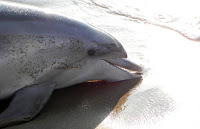Unprecedented death of dolphins in the Black Sea: causes and consequences
In recent months, the Black Sea witnessed a terrible tragedy, when an alarming number of dolphins washed ashore dead. This mass mortality event shocked the scientific community and raised concerns about the health of the marine ecosystem. In this article, we explore the possible causes of this disruptive phenomenon and explore the far-reaching implications for the fragile balance of the Black Sea.
We reveal the mystery of the death of Black Sea dolphins
The Black Sea, a magical expanse of water located between Europe and Asia, has long captured the hearts of explorers and nature lovers. However, beneath his carefree surface, a tragedy of unprecedented scale is unfolding. Over the past few months, an alarming number of dolphins have died in an unexplained die-off, casting a dark shadow over the region's marine ecosystem.
Dive into the depths of possible causes
Scientists are grappling with the daunting task of untangling the tangled web of factors that may be contributing to this mass mortality. While a definitive answer remains elusive, several plausible explanations have emerged.
1. Collateral damage of war:
The ongoing conflict in the region has undoubtedly had a devastating effect on the fragile balance of the Black Sea. Underwater explosions, sonar activities and the release of harmful substances from military vessels are believed to have caused serious damage to the dolphin population.
2. Habitat destruction and pollution:
For a long time, the Black Sea has been under the relentless pressure of human activity. Coastal development, unsustainable fishing practices and the discharge of untreated sewage have led to the degradation of dolphin habitats and the spread of pollutants in the marine environment.
3. Infectious diseases and biotoxins:
The introduction of non-native species, combined with the deteriorating health of the Black Sea, may have contributed to the spread of infectious diseases and the accumulation of biotoxins in the food chain, potentially harming dolphins.
4. Climate change and its impact:
Rising sea temperatures and ocean acidification linked to climate change are wreaking havoc on marine ecosystems around the world. These changes could disrupt food sources for dolphins, make them more susceptible to disease, and alter their migration patterns.
Ecosystem-wide consequences
The loss of dolphins is not just a tragedy for these magnificent creatures; this represents a major blow to the intricate web of life in the Black Sea. Dolphins play a critical role as top predators, helping to control prey populations and maintain ecosystem health. Their deaths can have a cascading effect on other marine species, potentially leading to an imbalance in the food chain and disruption of the overall ecosystem.
The plight of Black Sea dolphins is a vivid reminder of the fragile balance of nature and the far-reaching consequences of human actions. It is imperative that we take immediate, concerted action to protect these amazing creatures and the marine environment they call home.
International cooperation is critical to addressing the multifaceted threats facing Black Sea dolphins. Enforcing stricter environmental regulations, promoting sustainable fishing methods and investing in scientific research are important steps towards preserving this precious ecosystem.
The future of Black Sea dolphins depends on our collective responsibility to act now and preserve the fragile balance of life in this unique marine environment. Let us rise to the challenge and ensure that the haunting silence of empty dolphinariums does not become the defining legacy of our generation.
Together we can make a difference.




Comments
Post a Comment